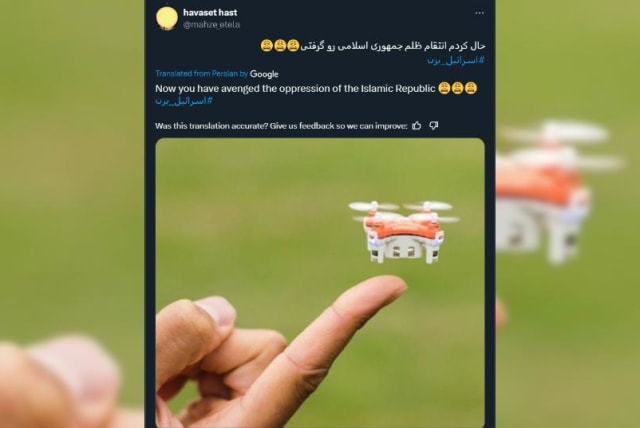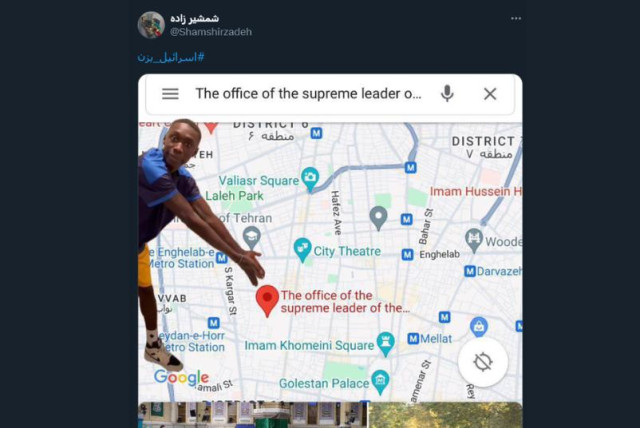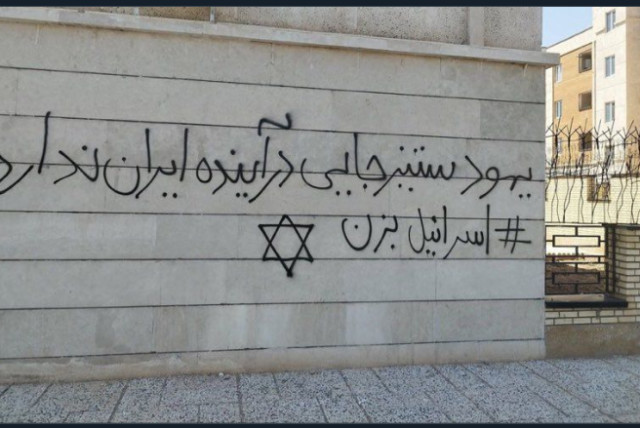Official Iranian sources refuse to attribute attack to Israel, minimize impact

Analysts noted a general trend within formal circles in the Islamic Republic attempting to minimize the attack and its implications.
The reports of attacks in Iran yesterday attributed to Israel, which led to a short period of chaos in which commercial flights were diverted and videos of explosions circulated online, sparked excitement and intense commentary online.
Analysts noted a general trend within formal circles in the Islamic Republic attempting to minimize the attack and its implications, broadcasting livestreams of downtown Esfahan as if to show that nothing had happened, and at times even refusing to name Israel as the potential aggressor. In this context, the IRGC’s Telegram channel quoted National Security Minister Itamar Ben Gvir’s tweet hinting at the attack, which included only one slang word, ‘dardale,’ meaning weak, poor, or disappointing. Here, too, the IRGC referred to ‘the events of today morning,’ without mentioning Israel or an attack.
Kioumars Heydari, Commander of the Islamic Republic’s Army's Ground Forces, announced today that the IR’s aerial defense systems managed to intercept an attack launched by “very small drones” inside Esfahan earlier this morning, also not referring to outside sources.
Other reports attributed these blasts to Iran's air defenses intercepting three drones. Notably, they too refrained from labeling the incident as an Israeli attack, instead describing it as infiltration, thereby possibly circumventing the immediate need for retaliation. A spokesperson for Iran, speaking to Reuters, indicated that there were currently no plans to retaliate against Israel following this ‘event’, adding that no external assault has been identified and that the prevailing speculation suggests infiltration rather than a direct attack.
The online arena: between mockery and hope
In the virtual arena, conflicting narratives arose for the attack.
Media outlets and mouthpieces affiliated with the regime mocked what they deemed the ecstasy of anti-regime and Western media, accusing them of exaggerating reports of large-scale attacks for internal purposes, while the real repercussions of the attack were practically non-existent.
In Al-Mayadeen, a mouthpiece accused of being a Hezbollah proxy loyal to Iran, correspondent in the Islamic Republic Malik Abeda also downplayed the attack and accused Western and Israeli media of exaggerating reports to “deceive general opinion and influence the Iranian home front” as well as “portray as if Israel had retaliated to the Iranian operation.”
Many pro-regime users resorted to mocking the alleged quadcopter strike. One pro-Islamic republic user mocked the Israeli air force posting a picture of a store-bought drone and adding that these truly are the renown Israel’s F35 fighters; while a pro-Islamic Republic news outlet showed pictures of a cruise missile and a little drone, claiming that this is a comparison between an Iranian retaliation and an Israeli one. Others joined the trend of accusing dissident media of exaggerating the strikes, accusing that “Israel’s retaliation was only on Iran International,” referring cynically to the well-known Persian-speaking anti-regime outlet. One user wrote: “as a result of the Israeli attack, five Iranians died of strong laughter and 10 others were injured from it as well.”
Likewise, one user denounced “sellouts” who cling to Israel in the hope of regime change; while another one taunted those who called Israel to strike Iran, adding that they are as sad as those who for weeks have been calling Iran to strike them yet all they got was this ridiculous scene, showing a hand-sized quadcopter.
However, those were not the only voices prominent online. For the past week since the Iranian missile and drone hostility against Israel, the hashtag “Israel, strike!” has gone viral, appearing both offline as graffiti paintings inside Iran also going viral online, with almost 30,000 appearances in the past seven days alone, and growing even stronger following yesterday’s events. Some of these posts which featured the hashtag included maps or pictures pointing at buildings of the regime, urging Israel to strike them.
One different user who wasn’t particularly impressed by the Iranian regime’s attempt to downplay the attack, uploaded a screenshot of an Iranian TV presenter who claimed that the situation in Esfahan was as usual, attributing an ironic quote to the presenter which read “and we don’t even have a city named Esfahan.” Similarly, another user referred to the continuous live broadcasts from downtown Esfahan adding unimpressed that Israel would never target the city center and thus implying that such broadcasts are meaningless.
Some users responded to mockery of Israel claiming that these strikes were only a first phase of Israel’s retaliation, an attempt to test Iranian air defense systems, or rather a statement of intent and warning to the Iranian regime; while others reminded their followers that everyone knows ahead of time before Iran attacks Israel, but Iran does not know when Israel would strike. One hopeful user also called on Israel to “return favor” to historical Persian King Cyrus who allowed Jews to return to Jerusalem from the Babylonian exile and build the temple – by destroying the Islamic Republic.
Jerusalem Post Store
`; document.getElementById("linkPremium").innerHTML = cont; var divWithLink = document.getElementById("premium-link"); if (divWithLink !== null && divWithLink !== 'undefined') { divWithLink.style.border = "solid 1px #cb0f3e"; divWithLink.style.textAlign = "center"; divWithLink.style.marginBottom = "15px"; divWithLink.style.marginTop = "15px"; divWithLink.style.width = "100%"; divWithLink.style.backgroundColor = "#122952"; divWithLink.style.color = "#ffffff"; divWithLink.style.lineHeight = "1.5"; } } (function (v, i) { });


